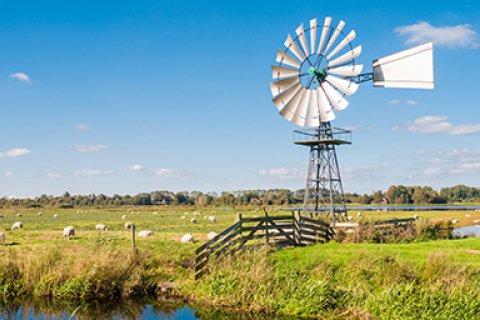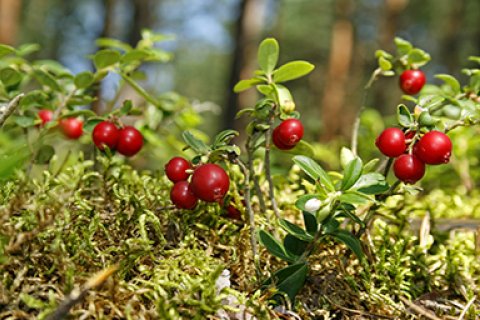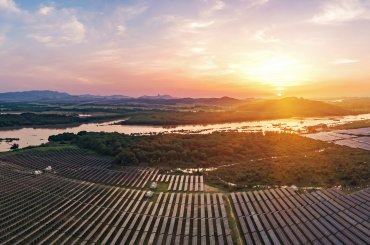What’s keeping the application of our vast innovative knowledge?
Sustainability scientists on the NRC climate blog
We have plenty of innovative solutions to climate change. Many of them are not put to use because we do not know how to apply them properly. See, for instance, the peatlands policy, write sustainability scientists Jerry van Dijk, Hens Runhaar, René Verburg and Marko Hekkert of Utrecht University.
This blog was published on 4 December 2018 on the climate blog of the NRC.
Dutch peatlands are not only extremely sensitive to the consequences of climate change, but they are also significant contributors to the problem itself. Peatlands are composed of non-degraded plant residue that, long before the land was reclaimed, absorbed carbon from the atmosphere and sequestered it in the vast marshlands that made up the lowland Netherlands at the time.
It is estimated that the upper 30 centimetres of these peaty soils alone hold the equivalent of some 270 megatonnes of CO2, which is about 1.5 times the current annual greenhouse gas emission for the entire Netherlands. This is fine as long as it stays there; except it doesn’t.

The peaty soils are drained to enable agriculture. This causes the peat to oxidise and the carbon being released back into the atmosphere, where it contributes to further climate change. The disappearance of all this carbon leads to soil subsidence, sometimes up to several centimetres per year. Since this brings the groundwater closer to the soil surface so that the soil becomes wetter, the peatlands need to be drained further, causing even more subsidence and CO2 release. It is a catch-22 situation.
The disadvantages are numerous - from damages to infrastructure and residential buildings, to higher risks of flooding and more difficult (and thus more expensive) water management. Various cost-benefit analyses have shown that the high costs involved in the soil subsidence will continue to rise, whereas the profits to be made by agriculture will continue to fall. We have been aware of this for over twenty years, yet we doggedly continue to lower the groundwater level.
Rewetting is not possible
The reason: we have no other option. Rewetting of the peatlands would bring about the immediate demise of the majority of dairy farms as we know them. Since wetter soils result in a decrease in grass production, make it more difficult to work the land and reduce the number of cattle that it can support, milk production will drop, and milk production costs will sharply rise. This, however, is an impossibility in the current agricultural system.
We have been aware of this for over twenty years, yet we doggedly continue to lower the groundwater level.
Milk production focuses on the international market, where the milk price has been low for years and, due to strong fluctuations, regularly drops below the current cost price. The only way to make some money is increasing rather than decreasing production and scale to keep the cost price down. Furthermore, all the associated industries – from banking to water management, and from knowledge institutions to agro-food chains – are fully geared to this productivist model. Extensification is simply not an option.
Any farmer seeking to escape this system must find an alternative way to recover the costs of their milk production. Various research and design programmes, such as ‘Waarheen met het veen’ and the more recent ‘Veenatelier’ have examined ways to achieve this with higher water levels.

With higher water levels, a significant proportion of dairy farmers will have to switch to nature-inclusive agriculture, with fewer cattle and lower production but with additional income from nature management. In the wettest areas, so-called paludiculture could be a solution, such as cranberries or water ferns that could serve as high-protein cattle feed.
In order to bring in enough to maintain sufficient economic possibilities for the agricultural industry, part of the lost income must be compensated. This could be achieved through direct product sales, which have a far higher margin, direct payment of services rendered to society, or remuneration for reduction of CO2 emissions. There would be a nice bycatch: the region would become more liveable and attractive in terms of recreation and, last but not least, it would be beneficial to the biodiversity and climate.
But a market for local produce and sustainable dairy is a suitable alternative only for a minority of the dairy farmers in the peatlands. The current laws and legislation do not allow for paying farmers directly for their services to society and decreased CO2 emission – which is one of the essential financial bases for the plans we referred to above. Tackling the peatlands issue is, in other words, not due to the lack of innovative solutions, but rather the absence of new and smart rules of play that lead to sustainable management of the peatlands as well as a decent income for farmers.
Lessons learned
The continuing peatlands issue clearly shows that the current innovation policy is not geared to solving societal issues such as climate change because the main bottlenecks in many of these challenges are not of a technological nature.
Tackling the peatlands issue is not due to the lack of innovative solutions, but rather the absence of new and smart rules of play that lead to sustainable management of the peatlands as well as a decent income for farmers.
Innovation fails not only because of strict rules like legislation and market conditions but also because of softer rules like habits and culture. Any innovation in these rules requires input of a huge amount of knowledge, but current innovation policy mainly concentrates on solutions of the ‘nuts and bolts’ type.
The bias in the knowledge base that feeds decision-makers is astonishing. Almost all investments go into new technology, whereas know-how of institutional change and social innovations hardly receive any attention. This seems to be a blind spot for policymakers and funders. If we really want to speed up societal transition in the Netherlands, it is high time that this ‘softer’ side of innovation gets the attention it needs.
Scientists from Utrecht University are reporting in the climate blog of the NRC on their research in the field of sustainability. They are united around the strategic theme of 'Pathways to Sustainability'.

Come out of the laboratory and work on the good life
Engineers should not only be studying the climate, they also have a duty to work with sociologists in identifying ways to implement their recommendations, writes Maarten Hajer.

Climate change might see our savings dwindle
Banks and pension funds are still not taking sufficient account of the risks of climate change, writes Mark Sanders.



